Applied Ethics: Evaluating MNC Impact on Developing Economies
VerifiedAdded on 2021/05/31
|7
|1122
|94
Essay
AI Summary
This essay delves into the ethical considerations surrounding multinational corporations (MNCs) operating in developing countries. It identifies service, progress, and responsibility as key virtues pertinent to the discussion, highlighting the tension between the liberal principles of personal freedom and the potential drawbacks of globalization. The essay examines how MNCs contribute to economic growth through skill transfer and employment opportunities but also pose threats to local economies and the environment. Using Kantian ethics and the categorical imperative, the analysis reveals that while MNCs may benefit certain segments of society, they can also exacerbate inequalities and harm local businesses. The essay concludes by emphasizing the ethical dilemmas inherent in allowing MNCs to operate in developing countries, balancing potential economic advantages against the risk of environmental damage and the marginalization of local economies. Desklib provides access to this and other solved assignments for students.
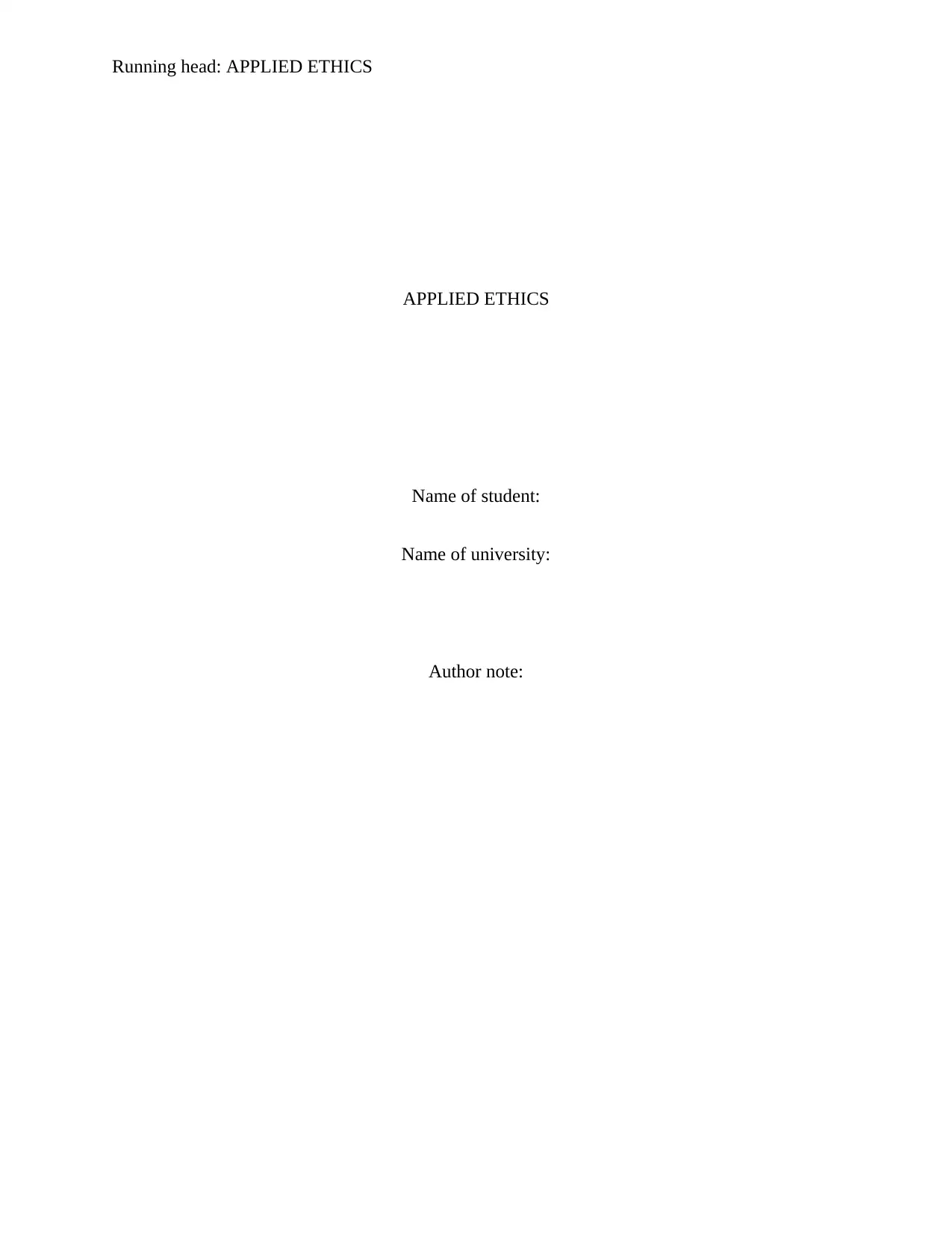
Running head: APPLIED ETHICS
APPLIED ETHICS
Name of student:
Name of university:
Author note:
APPLIED ETHICS
Name of student:
Name of university:
Author note:
Paraphrase This Document
Need a fresh take? Get an instant paraphrase of this document with our AI Paraphraser
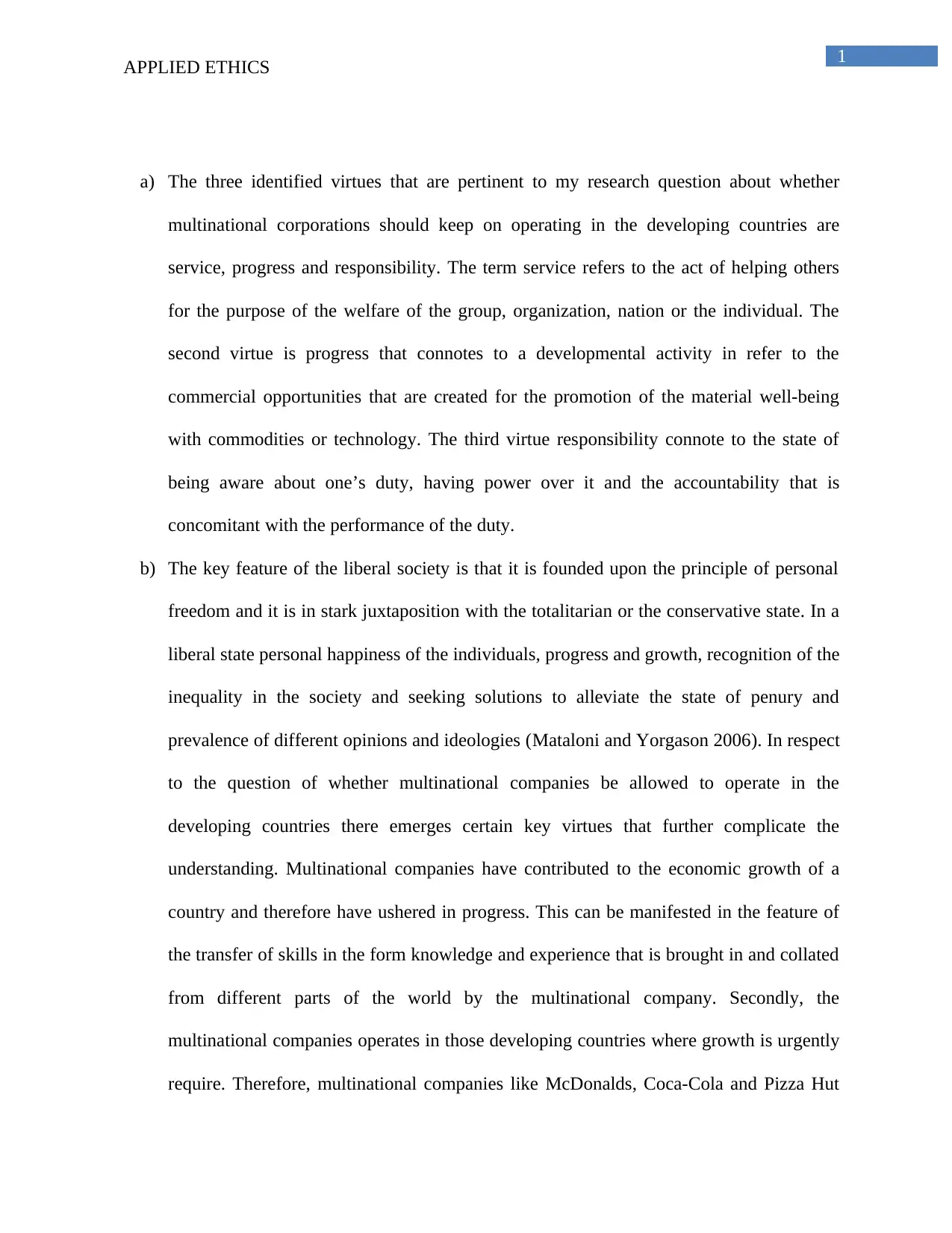
1
APPLIED ETHICS
a) The three identified virtues that are pertinent to my research question about whether
multinational corporations should keep on operating in the developing countries are
service, progress and responsibility. The term service refers to the act of helping others
for the purpose of the welfare of the group, organization, nation or the individual. The
second virtue is progress that connotes to a developmental activity in refer to the
commercial opportunities that are created for the promotion of the material well-being
with commodities or technology. The third virtue responsibility connote to the state of
being aware about one’s duty, having power over it and the accountability that is
concomitant with the performance of the duty.
b) The key feature of the liberal society is that it is founded upon the principle of personal
freedom and it is in stark juxtaposition with the totalitarian or the conservative state. In a
liberal state personal happiness of the individuals, progress and growth, recognition of the
inequality in the society and seeking solutions to alleviate the state of penury and
prevalence of different opinions and ideologies (Mataloni and Yorgason 2006). In respect
to the question of whether multinational companies be allowed to operate in the
developing countries there emerges certain key virtues that further complicate the
understanding. Multinational companies have contributed to the economic growth of a
country and therefore have ushered in progress. This can be manifested in the feature of
the transfer of skills in the form knowledge and experience that is brought in and collated
from different parts of the world by the multinational company. Secondly, the
multinational companies operates in those developing countries where growth is urgently
require. Therefore, multinational companies like McDonalds, Coca-Cola and Pizza Hut
APPLIED ETHICS
a) The three identified virtues that are pertinent to my research question about whether
multinational corporations should keep on operating in the developing countries are
service, progress and responsibility. The term service refers to the act of helping others
for the purpose of the welfare of the group, organization, nation or the individual. The
second virtue is progress that connotes to a developmental activity in refer to the
commercial opportunities that are created for the promotion of the material well-being
with commodities or technology. The third virtue responsibility connote to the state of
being aware about one’s duty, having power over it and the accountability that is
concomitant with the performance of the duty.
b) The key feature of the liberal society is that it is founded upon the principle of personal
freedom and it is in stark juxtaposition with the totalitarian or the conservative state. In a
liberal state personal happiness of the individuals, progress and growth, recognition of the
inequality in the society and seeking solutions to alleviate the state of penury and
prevalence of different opinions and ideologies (Mataloni and Yorgason 2006). In respect
to the question of whether multinational companies be allowed to operate in the
developing countries there emerges certain key virtues that further complicate the
understanding. Multinational companies have contributed to the economic growth of a
country and therefore have ushered in progress. This can be manifested in the feature of
the transfer of skills in the form knowledge and experience that is brought in and collated
from different parts of the world by the multinational company. Secondly, the
multinational companies operates in those developing countries where growth is urgently
require. Therefore, multinational companies like McDonalds, Coca-Cola and Pizza Hut
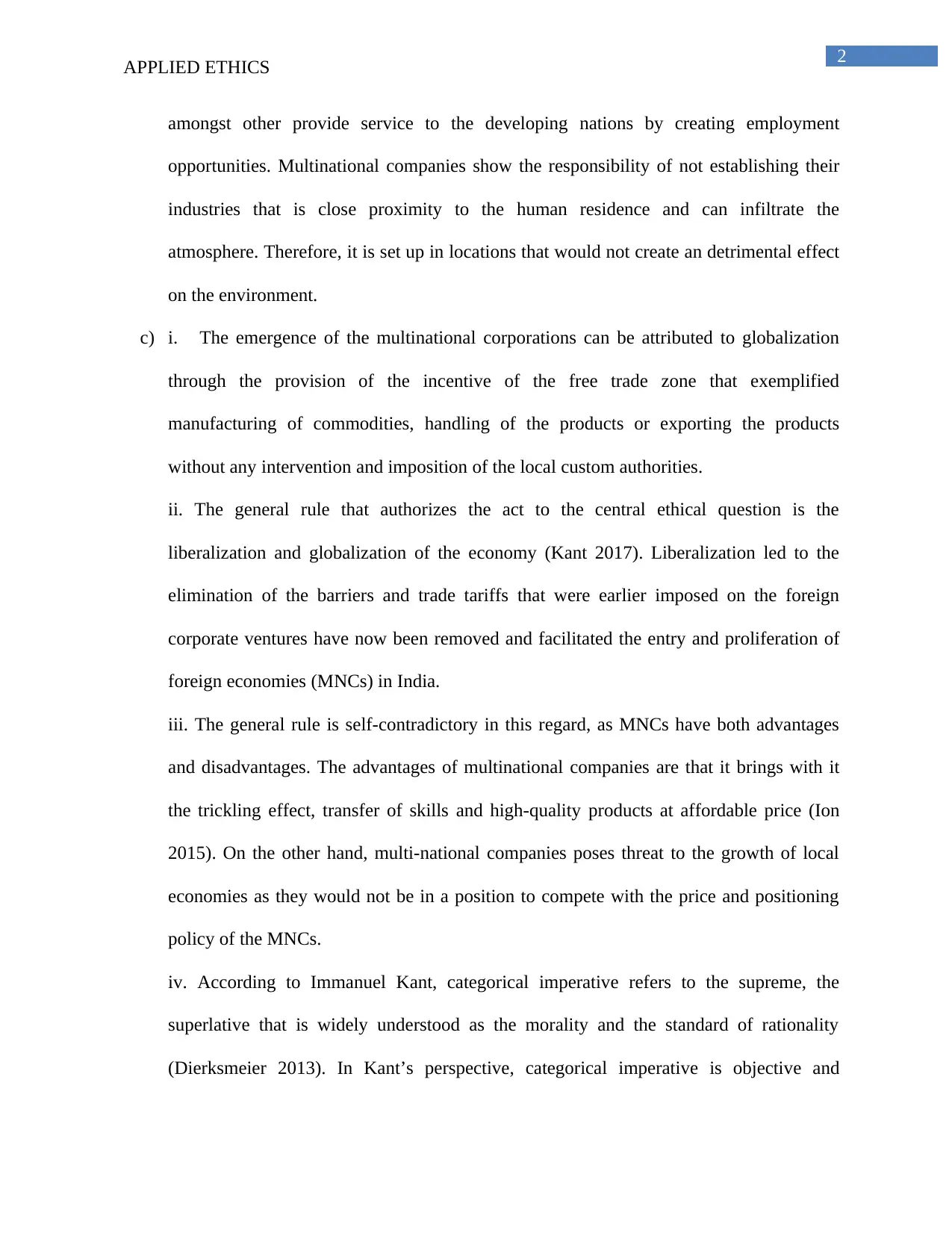
2
APPLIED ETHICS
amongst other provide service to the developing nations by creating employment
opportunities. Multinational companies show the responsibility of not establishing their
industries that is close proximity to the human residence and can infiltrate the
atmosphere. Therefore, it is set up in locations that would not create an detrimental effect
on the environment.
c) i. The emergence of the multinational corporations can be attributed to globalization
through the provision of the incentive of the free trade zone that exemplified
manufacturing of commodities, handling of the products or exporting the products
without any intervention and imposition of the local custom authorities.
ii. The general rule that authorizes the act to the central ethical question is the
liberalization and globalization of the economy (Kant 2017). Liberalization led to the
elimination of the barriers and trade tariffs that were earlier imposed on the foreign
corporate ventures have now been removed and facilitated the entry and proliferation of
foreign economies (MNCs) in India.
iii. The general rule is self-contradictory in this regard, as MNCs have both advantages
and disadvantages. The advantages of multinational companies are that it brings with it
the trickling effect, transfer of skills and high-quality products at affordable price (Ion
2015). On the other hand, multi-national companies poses threat to the growth of local
economies as they would not be in a position to compete with the price and positioning
policy of the MNCs.
iv. According to Immanuel Kant, categorical imperative refers to the supreme, the
superlative that is widely understood as the morality and the standard of rationality
(Dierksmeier 2013). In Kant’s perspective, categorical imperative is objective and
APPLIED ETHICS
amongst other provide service to the developing nations by creating employment
opportunities. Multinational companies show the responsibility of not establishing their
industries that is close proximity to the human residence and can infiltrate the
atmosphere. Therefore, it is set up in locations that would not create an detrimental effect
on the environment.
c) i. The emergence of the multinational corporations can be attributed to globalization
through the provision of the incentive of the free trade zone that exemplified
manufacturing of commodities, handling of the products or exporting the products
without any intervention and imposition of the local custom authorities.
ii. The general rule that authorizes the act to the central ethical question is the
liberalization and globalization of the economy (Kant 2017). Liberalization led to the
elimination of the barriers and trade tariffs that were earlier imposed on the foreign
corporate ventures have now been removed and facilitated the entry and proliferation of
foreign economies (MNCs) in India.
iii. The general rule is self-contradictory in this regard, as MNCs have both advantages
and disadvantages. The advantages of multinational companies are that it brings with it
the trickling effect, transfer of skills and high-quality products at affordable price (Ion
2015). On the other hand, multi-national companies poses threat to the growth of local
economies as they would not be in a position to compete with the price and positioning
policy of the MNCs.
iv. According to Immanuel Kant, categorical imperative refers to the supreme, the
superlative that is widely understood as the morality and the standard of rationality
(Dierksmeier 2013). In Kant’s perspective, categorical imperative is objective and
⊘ This is a preview!⊘
Do you want full access?
Subscribe today to unlock all pages.

Trusted by 1+ million students worldwide
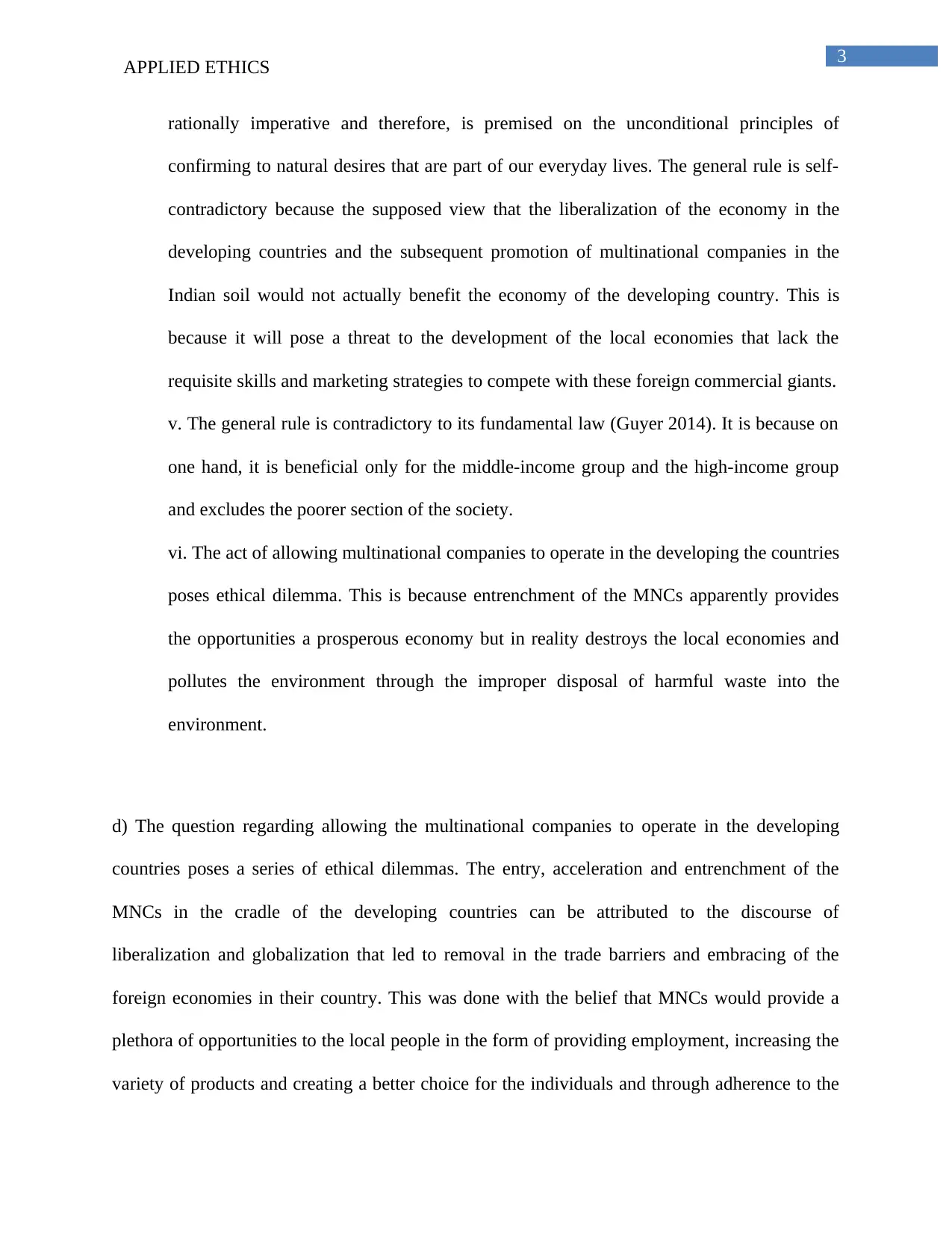
3
APPLIED ETHICS
rationally imperative and therefore, is premised on the unconditional principles of
confirming to natural desires that are part of our everyday lives. The general rule is self-
contradictory because the supposed view that the liberalization of the economy in the
developing countries and the subsequent promotion of multinational companies in the
Indian soil would not actually benefit the economy of the developing country. This is
because it will pose a threat to the development of the local economies that lack the
requisite skills and marketing strategies to compete with these foreign commercial giants.
v. The general rule is contradictory to its fundamental law (Guyer 2014). It is because on
one hand, it is beneficial only for the middle-income group and the high-income group
and excludes the poorer section of the society.
vi. The act of allowing multinational companies to operate in the developing the countries
poses ethical dilemma. This is because entrenchment of the MNCs apparently provides
the opportunities a prosperous economy but in reality destroys the local economies and
pollutes the environment through the improper disposal of harmful waste into the
environment.
d) The question regarding allowing the multinational companies to operate in the developing
countries poses a series of ethical dilemmas. The entry, acceleration and entrenchment of the
MNCs in the cradle of the developing countries can be attributed to the discourse of
liberalization and globalization that led to removal in the trade barriers and embracing of the
foreign economies in their country. This was done with the belief that MNCs would provide a
plethora of opportunities to the local people in the form of providing employment, increasing the
variety of products and creating a better choice for the individuals and through adherence to the
APPLIED ETHICS
rationally imperative and therefore, is premised on the unconditional principles of
confirming to natural desires that are part of our everyday lives. The general rule is self-
contradictory because the supposed view that the liberalization of the economy in the
developing countries and the subsequent promotion of multinational companies in the
Indian soil would not actually benefit the economy of the developing country. This is
because it will pose a threat to the development of the local economies that lack the
requisite skills and marketing strategies to compete with these foreign commercial giants.
v. The general rule is contradictory to its fundamental law (Guyer 2014). It is because on
one hand, it is beneficial only for the middle-income group and the high-income group
and excludes the poorer section of the society.
vi. The act of allowing multinational companies to operate in the developing the countries
poses ethical dilemma. This is because entrenchment of the MNCs apparently provides
the opportunities a prosperous economy but in reality destroys the local economies and
pollutes the environment through the improper disposal of harmful waste into the
environment.
d) The question regarding allowing the multinational companies to operate in the developing
countries poses a series of ethical dilemmas. The entry, acceleration and entrenchment of the
MNCs in the cradle of the developing countries can be attributed to the discourse of
liberalization and globalization that led to removal in the trade barriers and embracing of the
foreign economies in their country. This was done with the belief that MNCs would provide a
plethora of opportunities to the local people in the form of providing employment, increasing the
variety of products and creating a better choice for the individuals and through adherence to the
Paraphrase This Document
Need a fresh take? Get an instant paraphrase of this document with our AI Paraphraser
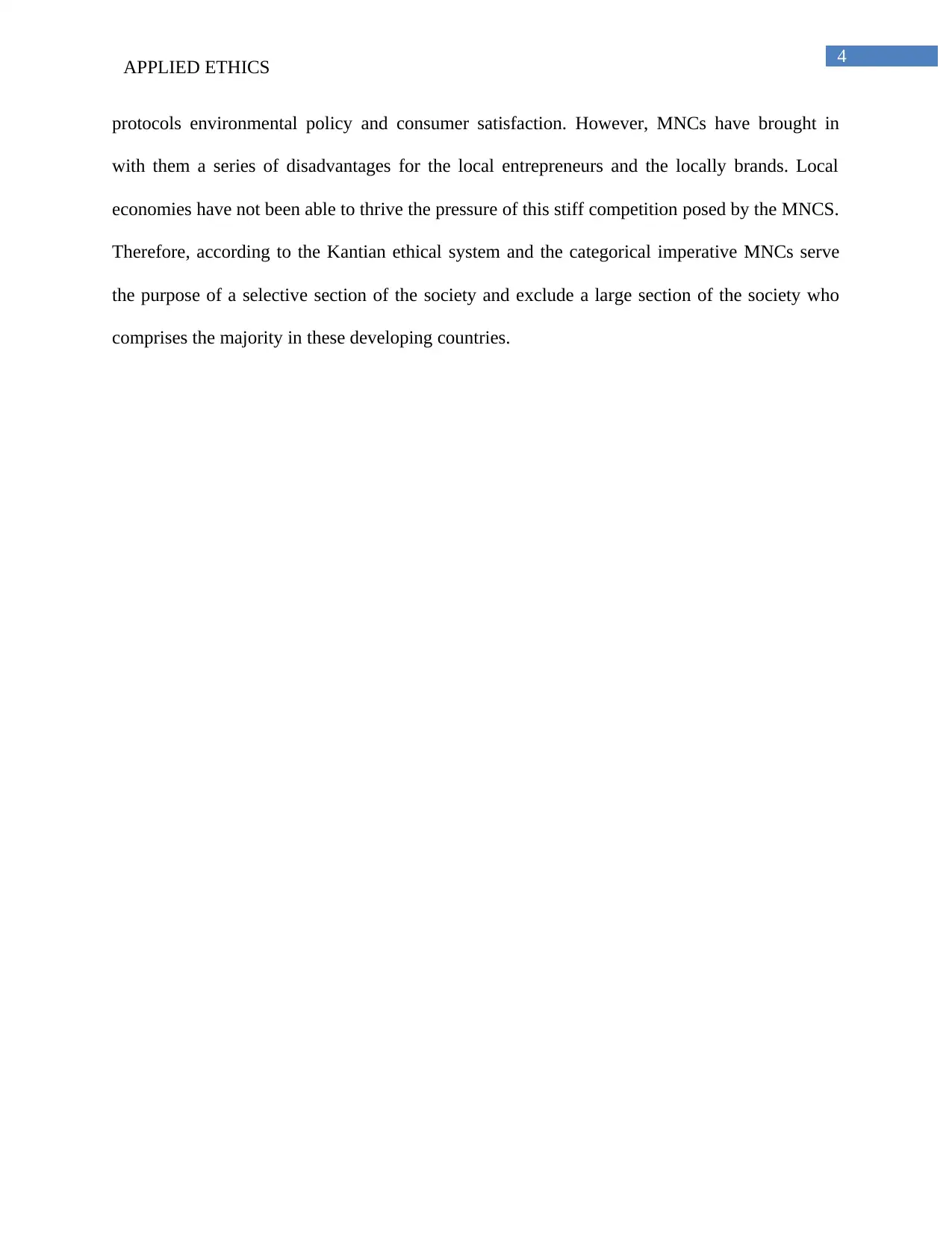
4
APPLIED ETHICS
protocols environmental policy and consumer satisfaction. However, MNCs have brought in
with them a series of disadvantages for the local entrepreneurs and the locally brands. Local
economies have not been able to thrive the pressure of this stiff competition posed by the MNCS.
Therefore, according to the Kantian ethical system and the categorical imperative MNCs serve
the purpose of a selective section of the society and exclude a large section of the society who
comprises the majority in these developing countries.
APPLIED ETHICS
protocols environmental policy and consumer satisfaction. However, MNCs have brought in
with them a series of disadvantages for the local entrepreneurs and the locally brands. Local
economies have not been able to thrive the pressure of this stiff competition posed by the MNCS.
Therefore, according to the Kantian ethical system and the categorical imperative MNCs serve
the purpose of a selective section of the society and exclude a large section of the society who
comprises the majority in these developing countries.
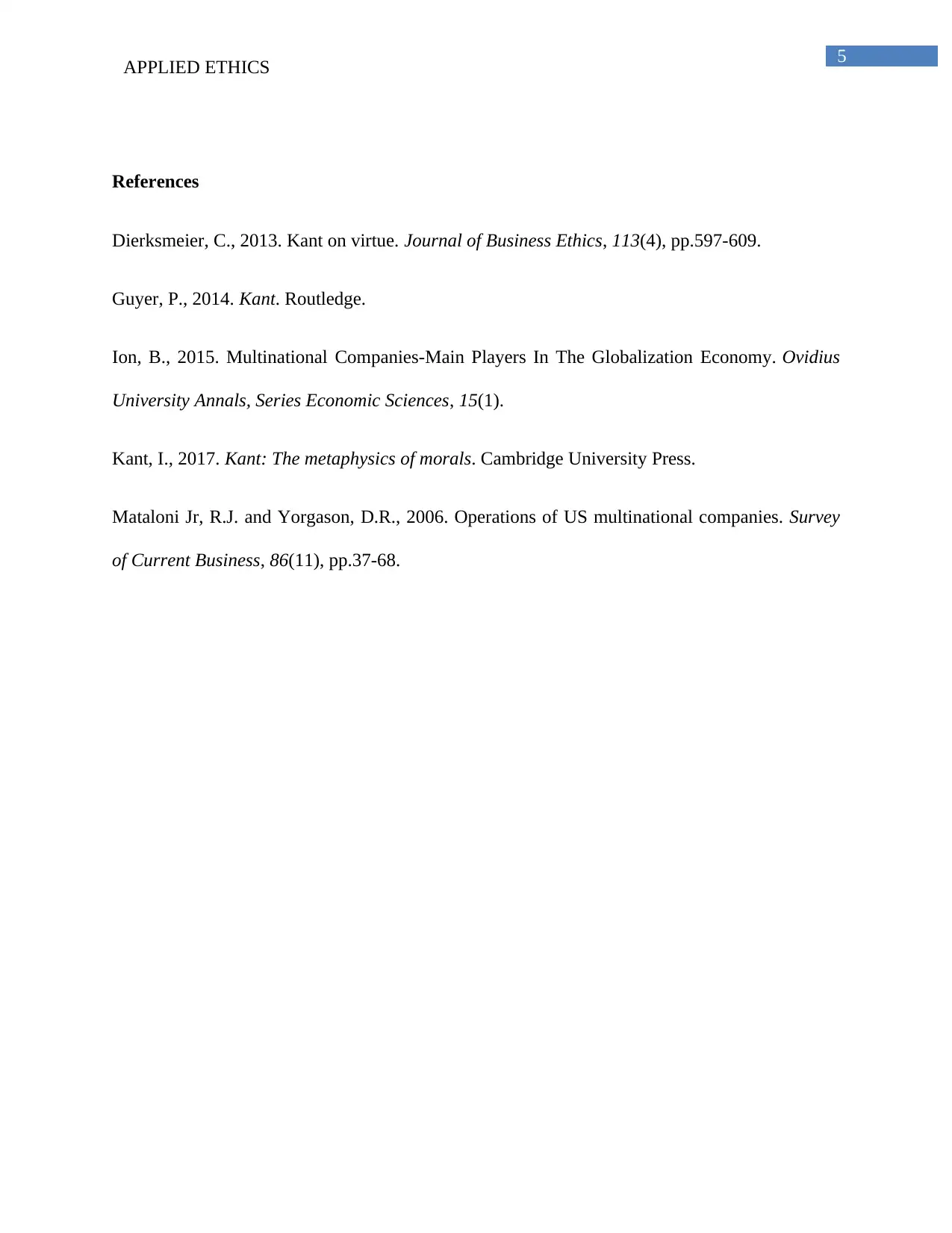
5
APPLIED ETHICS
References
Dierksmeier, C., 2013. Kant on virtue. Journal of Business Ethics, 113(4), pp.597-609.
Guyer, P., 2014. Kant. Routledge.
Ion, B., 2015. Multinational Companies-Main Players In The Globalization Economy. Ovidius
University Annals, Series Economic Sciences, 15(1).
Kant, I., 2017. Kant: The metaphysics of morals. Cambridge University Press.
Mataloni Jr, R.J. and Yorgason, D.R., 2006. Operations of US multinational companies. Survey
of Current Business, 86(11), pp.37-68.
APPLIED ETHICS
References
Dierksmeier, C., 2013. Kant on virtue. Journal of Business Ethics, 113(4), pp.597-609.
Guyer, P., 2014. Kant. Routledge.
Ion, B., 2015. Multinational Companies-Main Players In The Globalization Economy. Ovidius
University Annals, Series Economic Sciences, 15(1).
Kant, I., 2017. Kant: The metaphysics of morals. Cambridge University Press.
Mataloni Jr, R.J. and Yorgason, D.R., 2006. Operations of US multinational companies. Survey
of Current Business, 86(11), pp.37-68.
⊘ This is a preview!⊘
Do you want full access?
Subscribe today to unlock all pages.

Trusted by 1+ million students worldwide

6
APPLIED ETHICS
APPLIED ETHICS
1 out of 7
Related Documents
Your All-in-One AI-Powered Toolkit for Academic Success.
+13062052269
info@desklib.com
Available 24*7 on WhatsApp / Email
![[object Object]](/_next/static/media/star-bottom.7253800d.svg)
Unlock your academic potential
Copyright © 2020–2026 A2Z Services. All Rights Reserved. Developed and managed by ZUCOL.




